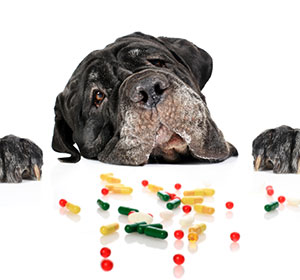
 Taking medication(s) prescribed for someone else can place you at risk of a serious reaction, possibly even death – this applies to your pets too! There are many medications used for animals and humans however, the dosage(s) and affects aren’t always the same. Approximately, one-quarter of all phone calls to the ASPCA Animal Poison Control Center (APCC) pertain to human medication that a pet may have ingested. Your pet can easily ingest a pill that has been dropped or unknowingly be given a harmful human medications by an unknowing owner, resulting in illness, or even death. Below, you’ll find a list of medications that should NEVER be given to your pet(s). If this were to occur, call the ASPCA as soon as possible. Be aware of the $65 charge to receive a phone diagnosis, but it is well worth it. Recently, I had a case in which one of our family dachshunds ingested an unknown substance and the reaction was very concerning. We immediately took her to the local animal emergency clinic, because our vet’s clinic was closed. Upon arrival, we could not give any details regarding what she had gotten into, so the ER veterinarian started IV fluids, drew blood and a urine sample. Unfortunately, we still don’t know what she was exposed to, but after a night in the vet hospital on IV fluids, being monitored constantly flushed out whatever it was that caused the reaction. The vets treated our dog as if she was experiencing toxicity which is what will happen. Unfortunately, there is no “drug test” for pets. Whatever information you can give the vet, will help though. How many pills, the name of the medication (bring the bottle if you are able to), and approximately time of ingestion or exposure. This could also mean plants and insecticides. Home owners should always avoid spraying any pesticide on grass and the area(s) where their pet(s) may do their business. Keep the area safe and free of as much contamination as possible.
Taking medication(s) prescribed for someone else can place you at risk of a serious reaction, possibly even death – this applies to your pets too! There are many medications used for animals and humans however, the dosage(s) and affects aren’t always the same. Approximately, one-quarter of all phone calls to the ASPCA Animal Poison Control Center (APCC) pertain to human medication that a pet may have ingested. Your pet can easily ingest a pill that has been dropped or unknowingly be given a harmful human medications by an unknowing owner, resulting in illness, or even death. Below, you’ll find a list of medications that should NEVER be given to your pet(s). If this were to occur, call the ASPCA as soon as possible. Be aware of the $65 charge to receive a phone diagnosis, but it is well worth it. Recently, I had a case in which one of our family dachshunds ingested an unknown substance and the reaction was very concerning. We immediately took her to the local animal emergency clinic, because our vet’s clinic was closed. Upon arrival, we could not give any details regarding what she had gotten into, so the ER veterinarian started IV fluids, drew blood and a urine sample. Unfortunately, we still don’t know what she was exposed to, but after a night in the vet hospital on IV fluids, being monitored constantly flushed out whatever it was that caused the reaction. The vets treated our dog as if she was experiencing toxicity which is what will happen. Unfortunately, there is no “drug test” for pets. Whatever information you can give the vet, will help though. How many pills, the name of the medication (bring the bottle if you are able to), and approximately time of ingestion or exposure. This could also mean plants and insecticides. Home owners should always avoid spraying any pesticide on grass and the area(s) where their pet(s) may do their business. Keep the area safe and free of as much contamination as possible.
- Ibuprofen – Ibuprofen (Advil® and Motrin®) is the most common human medication ingested by pets. Many brands have a sweet outer coating that makes it appealing to pets (think “M&M,” but a potentially deadly one). Ibuprofen can cause stomach ulcers and kidney failure.
- Tramadol – Tramadol (Ultram®) is a pain reliever. Your veterinarian may prescribe it for your pet, but only at a dose that’s appropriate for your pet – never give your medication to your pet without first consulting your veterinarian! Too much tramadol can cause sedation or agitation, wobbliness, disorientation, vomiting, tremors and possibly seizures.
- Alprazolam – Alprazolam (Xanax®) is prescribed as an anti-anxiety medication and a sleep-aid. Most pets that ingest alprazolam can become sleepy and wobbly; however a few will become very agitated instead. These pills are commonly ingested by pets as people put them out on the nightstand so they remember to take them. Large doses of alprazolam can drop the blood pressure and could cause weakness or collapse.
- Adderall® – Adderall® is a combination of four different amphetamines and is used to treat Attention Deficit Hyperactivity Disorder (ADHD) in children. This medication doesn’t have the same effect in pets as it does in people; it acts as a stimulant in our pets and causes elevated heart rate and body temperature, along with hyperactivity, tremors and seizures.
- Zolpidem – Zolpidem (Ambien®) is a sleep-aid for people. Pets commonly eat pills left on the bedside table. Zolpidem may make cats wobbly and sleepy, but most pets become very agitated and develop elevated heart rates.
- Clonazepam – Clonazepam (Klonopin®) is used as an anticonvulsant and anti-anxiety medication. It is sometimes also prescribed as a sleep-aid. When animals ingest clonazepam they can become sleep and wobbly. Too much clonazepam can lower the blood pressure, leading to weakness or collapse.
- Acetaminophen – Acetaminophen (Tylenol®) is a very common pain killer found in most households. Cats are extremely sensitive to acetaminophen, but dogs can be affected too. Acetaminophen can cause liver damage. It can also cause damage to your pet’s red blood cells so that the cells are unable to carry oxygen – like your body, your pet’s body needs oxygen to survive.
- Naproxen – Naproxen (Aleve® and Naprosyn®) is an over-the-counter pain reliever. Dogs and cats are very sensitive to naproxen and even small amounts can cause stomach ulcers and kidney failure.
- Duloxetine – Duloxetine (Cymbalta®) is prescribed as an antidepressant and anti-anxiety agent. When ingested by pets it can cause agitation, vocalization, tremors and seizures.
- Venlafaxine – Venlafaxine (Effexor®) is an antidepressant. For some unknown reason, cats love to eat the capsules. Ingestion can cause agitation, vocalization, tremors and seizures.



